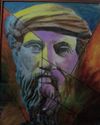
One morning in the marketplace, as the townspeople are enjoying what they think is the beginning of a day like any other, a dishevelled man holding a lantern appears out of nowhere. "I seek God! I seek God!" he begins to scream indiscriminately at both no one and everyone. Soon enough, a crowd forms around this spectacle of a person, and once they understand what's happening, the townspeople can't help but burst into laughter at the ridiculous sight of someone crazy enough to be out looking for God with a lantern. The madman, getting more and more impatient about not being taken seriously, finally snaps back at his audience: "Where is God? I will tell you. We have killed him and I!"
Dumbstruck, the townspeople aren't laughing anymore, and now just stand there in a daze. Fed up with his failed efforts to be heard, the madman finally smashes his lantern on the ground in one last fit of rage, and leaves, issuing the townspeople a last cryptic warning:
"I have come too early; my time is not yet. This tremendous event is still on its way, still wandering; it has not yet reached the ears of men. Lightning and thunder require time; the light of the stars requires time; deeds, though done, still require time to be seen and heard. This deed is still more distant from them than most distant stars - and yet they have done it themselves." (The Gay Science, Friedrich Nietzsche, 1882)
Esta historia es de la edición August/September 2022 de Philosophy Now.
Comience su prueba gratuita de Magzter GOLD de 7 días para acceder a miles de historias premium seleccionadas y a más de 9,000 revistas y periódicos.
Ya eres suscriptor ? Conectar
Esta historia es de la edición August/September 2022 de Philosophy Now.
Comience su prueba gratuita de Magzter GOLD de 7 días para acceder a miles de historias premium seleccionadas y a más de 9,000 revistas y periódicos.
Ya eres suscriptor? Conectar

FALLING DOWN
Thomas R. Morgan considers how personal identity is maintained, and how it is lost.

Pythagoras (570-495 BCE)
Daniel Toré looks beyond the mathematician to the philosopher.

Wordsworth & Darwin
Christine Avery wonders whether poetry can help us to deal with science.

Plants & Philosophy
Caroline Deforche sees similarities between gardening and philosophising.

Dr.Gindi sculptor, has a philosophical conversation with Richard Baron about sensation, life, infinity and, you guessed it, sculpture.
Dr. Gindi is one of Switzerland's foremost sculptors, whose work has been exhibited in many countries.

Thomas Aquinas on Extraterrestrial Life
Babatunde Onabajo tells us why Aquinas did not believe in aliens.

The Fire This Time
Tim Madigan on Ray Bradbury, Bertrand Russell and Fahrenheit 451.

Trust, Truth & Political Conversations
Adrian Brockless wants a recognition of human value in political debate.

Philosophy & The Crown
Vincent Di Norcia on monarchy and stability.

Technologists & Ethicists
Stephen L. Anderson laments inadequate moral insight among tech leaders.